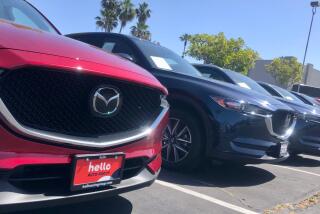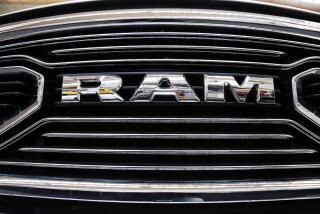Japanese Angry Over Dumping Allegations
- Share via
TOKYO — Japanese auto makers reacted with surprise and anger Monday to a charge that they were dumping minivans in the United States.
The Big Three U.S. auto makers filed a petition with the U.S. Commerce Department and the International Trade Administration on Friday claiming that Japanese producers were dumping minivans and damaging American industry.
It was the first such joint complaint of dumping ever filed by General Motors Corp., Ford Motor Co. and Chrysler Corp. They named Toyota Motor Corp., Mazda Motor Corp., Nissan Motor Co. and Mitsubishi Motors Corp. as the culprits.
A spokesman for Toyota said the company was most surprised by the charge and that it was unfounded. He said Toyota would not respond officially to the two U.S. government agencies until it received a questionnaire from Washington on the issue.
Toyota exported 42,000 minivans to the U.S. market in 1990, up from 10,000 in 1989, all of them made in Japan, he said.
A spokesman for Mazda denied it was guilty of dumping its MPV vans in the American market, in which it sold 43,095 units last year, up from 37,211 in 1989.
“This charge is very complex and requires full analysis,” he said. “We have not had the opportunity to review the charge so far. There has been a lot of speculation about the reason (for filing this petition), but we do not know what it is.”
A spokesman for Mitsubishi Motors declined official comment on the charges, saying only that the company had ceased exporting its Delica minivans to the U.S. market in March, 1990.
A Nissan spokesman said his company was not dumping its minivans in the United States but would withhold further comment until it knew the specific charges leveled against it.
House Majority Leader Richard Gephardt on Sunday said in a television interview that he believed that Japan was the dumping minivans in the United States, as domestic auto makers allege.
“I think in the area of automobiles there has been dumping,” Gephardt said on NBC Television’s “Meet the Press” program.
“I think the Japanese are known for this. They look at a market, they say, ‘Gee, the minivan is selling in the United States, let’s go after that market,’ so they sell cars here, in this case minivans, at less than what it cost them to produce that product in Japan.
“That’s an unfair trade practice. It’s going to be a problem,” Gephardt added.
One industry analyst in Tokyo said the minivan sector was one of the few in the U.S. auto market showing rapid growth.
“Up to now, the U.S. makers, especially Chrysler, have dominated this sector of the market,” he said. “Japanese makers have entered only recently and are moving aggressively in.”
He said the dumping charges were difficult to prove and would require months of investigation, but might have the immediate effect of making Japanese makers more cautious in their exports.






